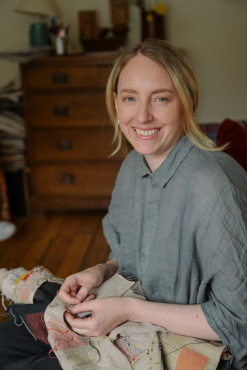You are here
- Home
- Dr Claire Wellesley-Smith
Dr Claire Wellesley-Smith
Professional biography
Claire Wellesley-Smith is an artist, curator, writer and researcher based in Bradford, West Yorkshire, UK. Her projects are situated within arts, heritage and community wellbeing. The ability of textile to transform and connect over time informs her studio, community and research practices. Prior to joining the Open University she researched, wrote, developed, delivered and evaluated multiple long-term socially engaged arts and heritage projects with community and care focussed organisations. Funders of this work include Kings Fund, Arts Council England, Mind, The Henry Smith Charity, Esmée Fairbairn Foundation, National Lottery Heritage Fund and NHS foundation trusts.
Teaching, visiting lectureships and artist residencies include West Dean College of Arts and Conservation, Crafts Council, Gawthorpe Textile Collection, Brontë Parsonage Museum, Royal School of Needlework, Fibre Arts Australia, Tversted Skole, Denmark, Cultureghem and FARO, Belgium and IASPIS, Sweden. Curation and exhibition work include projects for Museum Dr Guislain, Belgium, British Textile Biennial, Bradford 2025 City of Culture, 2012 Cultural Olympiad, Bradford Industrial Museum, Salts Mill and the Haworth Art Gallery.
Claire completed her AHRC funded doctoral research project in Geography at the Open University having previously completed a Masters in Visual Arts at Bradford School of Art and a BA in Politics at Newcastle University. She is currently a Grand Union DTP ESRC Postdoctoral Research Fellow in Geography.
Research interests
Claire's research iscurrently based in areas of former intensive industrial textile production in West Yorkshire and East Lancashire, places that now experience generational unemployment and pronounced health inequalities. Additional impacts of austerity and the pandemic have exacerbated existing inequalities. The research, based in long term community based creative heritage projects, explores how engagements with cultural heritage through slow, localised craft practices can construct and articulate collective identity and build resilience.
